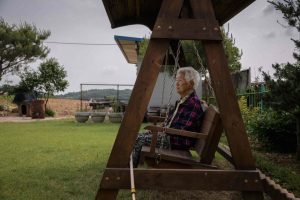In the News
07 January 2026 | When seniors live alone, it doesn’t mean that they’re lonely | The Straits Times
In this Straits Times commentary, A/Prof Vincent Chua (CFPR Steering Committee member), Prof Elaine Ho (CFPR International Advisory Board member (ex-officio)), and A/Prof Chen-Chieh Feng (CFPR Research Affiliate) challenge the assumption that older adults who live alone are necessarily socially isolated. Drawing on a study of nearly 1,200 older Singaporeans aged 60 to 92, the authors show that many seniors living alone remain socially active, mobile, and embedded in wider networks of family, friends, colleagues, and acquaintances. Titled “Ageing in Networks: Living Alone But Connected”, the paper featuring this study highlights how older adults’ lives unfold across the island rather than being confined to home. The authors argue that “living alone” is often used too simplistically as a convenient proxy for loneliness in policy design. They call for a network-based policy approach that focuses on mobility, digital inclusion, social participation, and meaningful connections, recognising that living alone does not necessarily equate to being lonely.
26 April 2025 | Seniors are taking the kampung spirit beyond the neighbourhood | The Straits Times
In an opinion piece to The Straits Times, CFPR Co-Director A/Prof Vincent Chua and CFPR research affiliates Prof Elaine Ho and A/Prof Chen-Chieh Feng shed light on their findings showing that older Singaporeans maintain diverse social ties, many of which extend far beyond their immediate residential neighbourhoods. This does not mean that the kampung spirit among seniors has disappeared. Rather, it has evolved beyond neighbourhood boundaries. Drawing on a study of nearly 1,200 Singaporeans aged 60 and above, the authors show that many seniors sustain rich social networks across the island, with named social contacts located, on average, about 4 km from where they live. Instead of ageing strictly “in place”, many seniors today are actively ageing in networks, travelling to maintain meaningful relationships and participate in social activities. The authors argue that policies focused solely on neighbourhood-based cohesion may overlook these broader patterns of social connection. Supporting age-friendly transport connectivity and creating elder-friendly facilities and activities that encourage social mixing across planning sectors can better enable seniors to remain socially engaged in an increasingly ageing yet mobile society.
28 Jan 2024 | Baby boom expected in China during Dragon Year not enough to save fertility crisis | The Straits Times
Assistant Professor Zheng Mu commented on China's birth numbers in the coming Year of the Dragon, and how that squares with its falling birth rate and population decline. For China to effectively boost its fertility rate, higher costs and systematic changes may be needed beyond the current governmental incentives offered.
13 Feb 2024 | Why the Year of the Dragon doesn't bode well for China's declining population| CNBC
Associate Professor Bussarawan Teerawichitchainan commented on Singapore's birth rates for 2024, noting that there may be a "small bump" this year, but will either sustain or continue to decline in the coming years.
18 April 2024| Waiting for the big reward: Children who are better in delaying gratification more likely to do well academically and have fewer behavioural problems | NUS News
Nationally representative data used in this study were part of the Singapore Longitudinal Early Development Study (SG-LEADS), led by Prof Yeung, funded by the Ministry of Education Social Science Research Thematic Grant, and housed by CFPR. The Delay-of-Gratification (DoG) choice paradigm indicated sound psychometric properties of the multi-trial actual choice task as a measure of DoG with Singaporean young children.
16-17 May 2024 | Population Association of Singapore 2024 Annual Meeting
On the first day of the conference, Minister Rajah keynote address on Singapore's demographic challenges, emphasising the need to address falling fertility rates and a rapidly ageing population. She highlighted the importance of leveraging technological advancements to support an ageing workforce and enhance caregiving for the elderly.
The conference has been featured in The Straits Times, Tamil Murasu, CNA and 8world.
To view the full article/video clips, click on the following links:
Channel 5 News (toward the end, starting at 22:10)
Associate Professor Bussarawan Teerawichitchainan pointed out a shift in marriage trends, noting a decreased urgency to marry amongst singles. She emphasised that marriage is still highly regarded, with many idealising a happy married life characterised by a comfortable home, stable income, and equality between partners in both earning and household responsibilities. However, many individuals are postponing marriage until they can achieve these conditions.
7 July 2024 | Social Network key to happiness of seniors with no kids: Study | The Sunday Times
Based on findings from the Childless Ageing in Singapore and Thailand (CAST) project, Associate Professor Bussarawan Teerawichitchainan highlighted the importance of strong social networks in supporting childless individuals' happiness and life satisfaction as they grow older without children to depend on. The Straits Times article featured the paper, published in April in The Journals of Gerontology, which found that four-fifths of childless individuals aged 50 and above in Singapore rated their well-being on comparable levels to those with children because they had support from family, friends or both.
7 July 2024 | Older adults without children bear lion's share of caregiving for parents: S'pore study | The Straits Times
Associate Professor Teerawichitchainan Bussarawan commented that these findings challenge the belief that childlessness indicates a break from traditional family norms. She noted that societal expectations for adult sons to support their parents may be weakening in Asia, and among childless individuals, factors like gender and birth order do not determine caregiving contributions.
28 Jan 2024 | Baby boom expected in China during Dragon Year not enough to save fertility crisis | The Straits Times
Assistant Professor Zheng Mu commented on China's birth numbers in the coming Year of the Dragon, and how that squares with its falling birth rate and population decline. For China to effectively boost its fertility rate, higher costs and systematic changes may be needed beyond the current governmental incentives offered.
13 Feb 2024 | Why the Year of the Dragon doesn't bode well for China's declining population| CNBC
Associate Professor Bussarawan Teerawichitchainan commented on Singapore's birth rates for 2024, noting that there may be a "small bump" this year, but will either sustain or continue to decline in the coming years.
18 April 2024| Waiting for the big reward: Children who are better in delaying gratification more likely to do well academically and have fewer behavioural problems | NUS News
Nationally representative data used in this study were part of the Singapore Longitudinal Early Development Study (SG-LEADS), led by Prof Yeung, funded by the Ministry of Education Social Science Research Thematic Grant, and housed by CFPR. The Delay-of-Gratification (DoG) choice paradigm indicated sound psychometric properties of the multi-trial actual choice task as a measure of DoG with Singaporean young children.
16-17 May 2024 | Population Association of Singapore 2024 Annual Meeting
On the first day of the conference, Minister Rajah keynote address on Singapore's demographic challenges, emphasising the need to address falling fertility rates and a rapidly ageing population. She highlighted the importance of leveraging technological advancements to support an ageing workforce and enhance caregiving for the elderly.
The conference has been featured in The Straits Times, Tamil Murasu, CNA and 8world.
To view the full article/video clips, click on the following links:
Channel 5 News (toward the end, starting at 22:10)
Associate Professor Bussarawan Teerawichitchainan pointed out a shift in marriage trends, noting a decreased urgency to marry amongst singles. She emphasised that marriage is still highly regarded, with many idealising a happy married life characterised by a comfortable home, stable income, and equality between partners in both earning and household responsibilities. However, many individuals are postponing marriage until they can achieve these conditions.
7 July 2024 | Social Network key to happiness of seniors with no kids: Study | The Sunday Times
Based on findings from the Childless Ageing in Singapore and Thailand (CAST) project, Associate Professor Bussarawan Teerawichitchainan highlighted the importance of strong social networks in supporting childless individuals' happiness and life satisfaction as they grow older without children to depend on. The Straits Times article featured the paper, published in April in The Journals of Gerontology, which found that four-fifths of childless individuals aged 50 and above in Singapore rated their well-being on comparable levels to those with children because they had support from family, friends or both.
7 July 2024 | Older adults without children bear lion's share of caregiving for parents: S'pore study | The Straits Times
Associate Professor Teerawichitchainan Bussarawan commented that these findings challenge the belief that childlessness indicates a break from traditional family norms. She noted that societal expectations for adult sons to support their parents may be weakening in Asia, and among childless individuals, factors like gender and birth order do not determine caregiving contributions.
28 Jan 2024 | Baby boom expected in China during Dragon Year not enough to save fertility crisis | The Straits Times
Assistant Professor Zheng Mu commented on China's birth numbers in the coming Year of the Dragon, and how that squares with its falling birth rate and population decline. For China to effectively boost its fertility rate, higher costs and systematic changes may be needed beyond the current governmental incentives offered.
13 Feb 2024 | Why the Year of the Dragon doesn't bode well for China's declining population| CNBC
Associate Professor Bussarawan Teerawichitchainan commented on Singapore's birth rates for 2024, noting that there may be a "small bump" this year, but will either sustain or continue to decline in the coming years.
18 April 2024| Waiting for the big reward: Children who are better in delaying gratification more likely to do well academically and have fewer behavioural problems | NUS News
Nationally representative data used in this study were part of the Singapore Longitudinal Early Development Study (SG-LEADS), led by Prof Yeung, funded by the Ministry of Education Social Science Research Thematic Grant, and housed by CFPR. The Delay-of-Gratification (DoG) choice paradigm indicated sound psychometric properties of the multi-trial actual choice task as a measure of DoG with Singaporean young children.
16-17 May 2024 | Population Association of Singapore 2024 Annual Meeting
On the first day of the conference, Minister Rajah keynote address on Singapore's demographic challenges, emphasising the need to address falling fertility rates and a rapidly ageing population. She highlighted the importance of leveraging technological advancements to support an ageing workforce and enhance caregiving for the elderly.
The conference has been featured in The Straits Times, Tamil Murasu, CNA and 8world.
To view the full article/video clips, click on the following links:
Channel 5 News (toward the end, starting at 22:10)
Associate Professor Bussarawan Teerawichitchainan pointed out a shift in marriage trends, noting a decreased urgency to marry amongst singles. She emphasised that marriage is still highly regarded, with many idealising a happy married life characterised by a comfortable home, stable income, and equality between partners in both earning and household responsibilities. However, many individuals are postponing marriage until they can achieve these conditions.
7 July 2024 | Social Network key to happiness of seniors with no kids: Study | The Sunday Times
Based on findings from the Childless Ageing in Singapore and Thailand (CAST) project, Associate Professor Bussarawan Teerawichitchainan highlighted the importance of strong social networks in supporting childless individuals' happiness and life satisfaction as they grow older without children to depend on. The Straits Times article featured the paper, published in April in The Journals of Gerontology, which found that four-fifths of childless individuals aged 50 and above in Singapore rated their well-being on comparable levels to those with children because they had support from family, friends or both.
7 July 2024 | Older adults without children bear lion's share of caregiving for parents: S'pore study | The Straits Times
Associate Professor Teerawichitchainan Bussarawan commented that these findings challenge the belief that childlessness indicates a break from traditional family norms. She noted that societal expectations for adult sons to support their parents may be weakening in Asia, and among childless individuals, factors like gender and birth order do not determine caregiving contributions.
11-12 May 2023 | Population Association of Singapore 2023 Annual MeetingOn the first day of the conference, Minister Rajah discussed the urgency of addressing the low fertility rates in Singapore and various population challenges that Singapore is currently facing. She also shared some of the Government's existing efforts to address population issues in Singapore, such as the push for flexi-work arrangements (FWAs). On this, she emphasizes that FWAs and work-from-home (WFH) are not interchangeable. To view the full article/video clips, click on the following links: Lianhe Zaobao: 2023 0512 ZB |
|
||
3 March 2023 | Low birth rates in China | DW (Deutsche Welle)'s Chinese ServiceA/P Puk advised on providing economic benefits such as housing subsidies to motivate people's willingness to marry and encourage childbearing. However, she also pointed out the limits of such economic subsidies. their limits. She emphasised that increasing birth rates also involved changing people's mindset and culture which may take time. |
|
||
17 February 2023 | Paternity Leave has doubled | The Straits Times | Bloomberg News | Channel 8CFPR is proud to share our SG LEADS data contributed to one of the most talked-about items in the recent 2023 Budget -- doubling of paternity leave to 4 weeks in Singapore. In 2013, one-week government paid paternity leave was introduced and this was doubled in 2017. This is a watershed moment in Asia to support fathers' roles in child development. A/P Vincent Chua also advised that we must be precautious and avoid a possible situation of "parenthood penalty" where fathers, like mothers before, are penalised at work for their commitments at home. He stressed that the workplaces and families need each other to survive as younger generations of the workforce must be replenished through families, in the long run. |
|||
17 January 2023 | China's population falls for first time since 1961| BBC NewsThe article discusses China's recent population trends seven years after the scraping of the one-child policy in 2016 and married couples being allowed to have two children. To slow the falling birth rate, the Chinese government also offered tax breaks and better maternal healthcare, among other incentives. However, these policies have not lead to a sustained increase in the births. A/P Teerawichitchainan sd that "apart from dishing out incentives to have children, China should also improve gender equality in households and workplaces". |
|||
17 January 2023 | 狮城有约 | 十分访谈:适应职场变化CFPR's founding director, Prof Jean Yeung did a live session on Channel 8 on 16 Jan 2023. She discussed work preparedness for different ages, gender, and education group and how childhood information may shape these attitudes and behaviour. |
|||
28 September 2022 | Singapore population grows 3.4% to 5.64m, reversing 2 consecutive years of decline | The Straits TimesWith the publication of Population in Brief 2022, CFPR's Research Associate Assistant Professor Tan Poh Lincommented about the fertility rate of Singapore, mentioning the need for more to be done to increase our birth rate. |
||
28 September 2022 | S'pore's population ageing rapidly: Nearly 1 in 5 citizens is 65 years and older | The Straits TimesWith the publication of Population in Brief 2022, CFPR's Research Associate Professor Thang Leng Lengcommented that with an ageing population in Singapore, there should be more efforts to prevent ageism, and more opportunities for inter-generational interaction to cultivate a society of mutual support and respect. |
||
27 September 2022 | 狮城有约 十分访谈: 2022年新加坡人口简报 [24:10 to 34:40] | Channel 8CFPR's Founding Director Prof Jean Yeung and CFPR Alum Dr Hu Shu were interviewed on Channel 8's Hello Singapore on this year's Population in Brief. They discussed about how Singapore can deal with an ageing population, as well as the marriage and birth rates trends. |
||
2 March 2022 | Provide childcare sick leave to all working parents & increase usage of paternity leave: Louis Ng | Mothership NewsThe SG LEADS on paternity leave was cited in the Parliament debate. MP Louis Ng raised the issue of childcare sick leave and paternity leave quoting the SG LEADS findings on how "children whose fathers take paternity leave are significantly less likely to have behavioural issues, and such families have fewer internal conflicts and a lower likelihood of maternal depression, among other benefits." He also added how we should look into paternity leave for lower-income workers based on the study. |
||
28 Nov 2021 | Broad-based schemes in place to help families hit by pandemic: MSF | The Straits TimesIn response to the SG LEADS data, the Ministry of Social and Family Development (MSF) said that it recognises that the pandemic has greatly affected the lives of many Singaporeans with fewer resources. The Singapore Government introduced a host of broad-based support schemes and targeted financial aid to help families cope with the financial impact of the pandemic. |
||
|
|
||
28 Nov 2021 | Ties didn't worsen for most families amid Covid-19 | The Straits TimesContrary to the widespread belief that the pandemic has increased tension between household members, the SG LEADS data shows that family relations have improved or at least stayed the same for most of the 3,018 families interviewed. About 41% of families said the pandemic has improved their family ties. Prof Jean Yeung explains that the pandemic has provided an opportunity for redistribution of housework and childcare responsibilities. She warns that we need to be careful to avoid having all the responsibilities fall on the mothers which may increase anxiety and conflicts in the family. |
||
|
|
||
28 Nov 2021 | Widow with 4 kids copes, thanks to govt, community aid | The Straits TimesThe second wave of the SG LEADS study found that lower-income families with young children have been hardest hit financially by the pandemic. The interviews involving more than 3,000 families found that 10% of these families were "sometimes" or "often" worried about food as they had no money to buy more food supplies. |
||
|
|
||
28 Nov 2021 | Lower-income families with young kids worst hit by pandemic | The Straits TimesProf Jean Yeung shared findings from SG LEADS about how home-based learning during the Covid-19 pandemic put children from lower-income families at a greater disadvantage. Prof Yeung explained that more families in HDB rental flats experienced job loss, as most work in lower-wage jobs in industries that were badly hit by Covid-19. She also noted that parents who were financially better-off were better equipped to aid their children with home-based learning to help them cope with the changes. Prof Yeung advised that sustained assistance is needed to avoid disadvantages arising from the pandemic being passed down to the next generation of lower-income families. |
||
|
|
||
|
|
18 Nov 2021 | China's Population Crisis | CNA Insight 2021/2022Prof Jean Yeung shared that the introduction of the One-Child Policy was to facilitate economic reform. She explained that the policy was simple-minded and did not consider the unintended consequences. Even the two-child policy introduced in 2015, had very little impact in increasing the birth rate. She discussed that changes in the way young people view family and the increased economic independence for women has affected the marriage and fertility rate. She discussed that a steep fall in the country's fertility rate coupled with a shrinking labour force might be overcome by technology.
|
|
|
|
||
 |
13 Oct 2021 | Young Children's Digital Device Use | Channel NewsAsia 938 Money MindProf Jean Yeung and former Research Affiliate Prof Lim Sun Sun discussed SG LEADS findings on trends in device use of young children in families of different socioeconomic profiles. They also discussed the effect of Covid-19 on device use in families and what all parents should note in managing their kids' screen time.
|
|
|
|
||
|
|
30 September 2021 | Singapore Population-in-brief | Channel 8's 'Hello Singapore'Prof Jean Yeung stated that the declined birth rate in 2020 does not have much to do with the COVID-19 pandemic as those babies were conceived before the pandemic began. However, the 12% decline in marriage rates does clearly tie to the pandemic as the drop during the circuit breaker was sharpest then, and the rate bounced back in the 4th quarter when restrictions were relaxed. Moreover, transnational marriages had declined from 37% to 30% due to travel restrictions. Prof Yeung also remarked that the fertility rate in Singapore is at an ultra-low level and without new immigrants, the population size is likely to continue to decline. |
|
|
|
||
|
|
17 September 2021 | Mind the Gap - Income Divide in Children's Use of Digital Devices | The Straits TimesProf Jean Yeung and former Research Affiliate Prof Lim Sun Sun shed light on device ownership and use by young families in Singapore. It reveals that toddlers from rental flats use electronic devices such as computers, tablets or smartphones almost four times as much as children in private condominiums and landed property. The authors explain that this difference could be due to children from higher-income families having greater access to other activities such as professional childcare and enrichment classes. Children living in rental flats, on the other hand, had less parental supervision. They also tended to use their devices more for games than for learning. |
|
|
|
||
4 September 2021 | Can racial harmony in Singapore be fostered by law | The Straits TimesA/Prof Tan Ern Ser remarks that proposed new Maintenance of Racial Harmony Act is important, as putting a culprit in jail may do nothing to change a person's view about a particular race. Furthermore, the less punitive approach may not necessarily be the easier path for an individual to take, considering how the offender is still held accountable for his actions, and has to make a conscious effort to make up for the damage caused to victims and communities. Offenders are given the chance to change their views without facing criminal prosecution. A/P Tan reiterated that since the objective of the new law is to protect and promote harmony, punishment should not be the only method to enforce change. |
||
|
|
||
 |
28 August 2021 | Singapore's thirty-somethings are leaving home | The EconomistProf Jean Yeung shared that Singapore's housing policy makes it difficult for young people to leave their nests. This is because they do not qualify for public housing of their own until they marry or turn 35. Hence, they have to rent in the private sector. Although the private sector housing used to be once catered almost exclusively to expats, it is now becoming more common for Singaporean singletons to move out to rent an apartment. |
|
|
|
||
|
27 August 2021 | Elderly may feel isolated even while living with kin | The Straits TimesThe new study has found that elderly folk living with their families may be surrounded by people but they can still feel socially isolated. The research involved data collected from 16,943 seniors who were part of the Singapore Chinese Health Study. A/P Feng Qiushi examined the data for socio-demographic and health factors linked to social disconnection among the elderly in Singapore. The research team found that regardless of living arrangements, factors such as low education level, cognitive impairment, fair or poor self-rated health, depression and limitations with daily living activities were all linked to the experience of social disconnection. |
||
|
|
||
|
|
15 August 2021 | Ban Tuition? It's Not So Easy | The Straits TimesA/P Vincent Chua commented about private tuition, offering the view that is not a simple matter of removing it altogether. The tuition system is ultimately a market system where parents are looking at what other parents do. Even if they believe that children lives should be more carefree, they feel constrained by what other parents are doing. Parents are also reading the signs in the labour market. If employers deem academics important, parents will tailor their strategies accordingly to what employers what. |
|
|
|
||
|
|
14 August 2021 | China holds competition for public to come up with three-child policy slogans but many are unimpressed | ABC NewsChina's Family Planning Association's is encouraging the public to come up with slogans to promote its three-child policy. This part of a bid to engage people in policymaking, was met by anger and sarcastic suggestions on Chinese social media. Prof Jean Yeung said Chinese people were tired of slogans after family planning policy changes. Prof Yeung advised that the Chinese government should tackle issues such as discrimination against women in the workplace and at home, affordable childcare and long-term monetary incentives. However, she explains that changes in policies probably would not make much difference for the fertility rate now. |
|
|
|
||
|
|
7 August 2021 | One United Nation | The Business TimesA/P Vincent Chua commented about the importance of foreigners in Singapore, stressing that they bring much economic value to Singapore, but also that they bring a rich social diversity to the Singapore scene. The article analyzes the roots of the foreigner divide in Singapore, tracing it to such issues as unequal wages that coincide with local-foreigner groups and the perceived competition that arises between the groups. |
|
|
|
||
|
|
||
|
|
26 June 2021 | Developing Asean is getting old before getting rich, and pensions aren't keeping pace | South China Morning PostIn Southeast Asia, families take the main responsibility of supporting and providing for the elderly. However, people are having fewer children and family size is decreasing. In the next three decades over one-fifth of the population will be aged 60 and above. A/Prof Bussarawan (Puk) Teerawichitchainan explained even wealthy countries, such as Japan, Singapore or South Korea, continue to "emphasise family as the front line of old-age support". She mentioned that the changes in family structures means some seniors may not have any children to rely on. Thus, government intervention becomes necessary and governments in the region need better plans to support senior citizens. |
|
|
|
||
|
|
20 June 2021 | Better outcomes in family when dads take paternity leave: Study | The Sunday TimesThe study reveals that families with fathers taking more paternity leave lead to significantly less likelihood of children having behavioural issues (e.g. hyperactivity). Moreover, such families also had less internal conflict and a lower likelihood of maternal depression, more marital satisfaction and father-child closeness. However, fathers in labour-intensive jobs were half as likely to take leave as fathers who worked as senior officials or managers. Prof Yeung suggested that this could be due to less flexible work hours and less supportive employers. The study also shows that men who were younger, had more education and higher income were more likely to take paternity leave. |
|
|
|
||
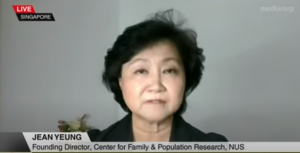 |
18 June 2021 | Singapore Census 2020 Findings | CNAProf Jean Yeung also predicted that the trend of shrinking household sizes will continue. This is because those who are married are having fewer children and more people are remaining unmarried. Hence, the more pressing challenges confronting Singapore are Fertility and Ageing. To improve these trends, Prof Yeung suggests reducing gender inequality at the workplace and at home. She shares that more long-term improvements such as flexible work hours, increased paternity leave, affordable childcare may help couples handle both work and family. In terms of ageing, she points out that we have been focusing on postponing the retirement age and enhancing the human capital for the young to old (to work more efficiently). |
|
|
|
||
13 June 2021 | Raising bilingual children is challenging but immensely rewarding | CNAA/P Leher Singh commented on the challenges and rewards of raising bilingual children. Children gravitate towards the language of their peers and larger community as they mature. As English is also the language of popular culture and entertainment choices, it gives many students a great deal of social appeal. Children's views of their mother tongue can turn from positive to negative within a few short years. A/P Singh suggests that building a personal connection with the mother tongue, outside of the classroom, can go a long way towards encouraging its use. Knowing our mother tongue can bring great joy and fulfillment, as well as valuable connections to our extended family, personal history, and culture. |
||
|
|
||
3 June 2021 | Kids with foreign-born mums show more behavioural problems due to more stressors at home: Study | The Straits TimesProf Jean Yeung stressed that it is not the migrant status of the mother that explains the behaviour problems in children in cross-national families with foreign-born mom, but the lower household income for such families that is associated with many stressors at home such as economic hardships, emotional distress and conflicts within the family. These stressors often lead to "…less warm parenting behaviour which in turn is associated with children having more externalising behaviour problems". Prof Yeung urges policymakers to focus on "interventions that can reduce economic hardship and alleviate emotional distress … (for all families)." |
||
|
|
||
1 June 2021 | China's pivot to a 3-child policy won't make a dent in its declining birth rate because the country's young couples don't want kids | Insider
Prof Jean Yeung shared with Insider that when it comes to the number of children people want to have, the reasons differ from person to person. Those who have more resources might not necessarily want bigger families. She mentions that in fact "those with high education and income focus on the quality, not quantity, of children." According to Prof Yeung, the proportion of the Chinese population who currently desire to have three children is "quite small" and thus, the three-child policy might not have a major effect on China's fertility rate. She surmised that there may be an initial boost to the number of babies, but any impact at all may be muted at best. |
||
|
|
||
1 June 2021 | China introduces three-child policy to alleviate problem of ageing population | ABC News
Prof Jean Yeung mentioned that the decrease in fertility rate is not fully attributed to the one-child policy which was introduced in 1979. She explains that the modernisation process where educated individuals, especially educated women, focus on the quality of children than the number of children. She predicts that the new policy might not have much impact on the fertility rate as the proportion of the Chinese population wanting three children is very small. She suggests that to tackle the ageing issue, China needs to increase the retirement age due to the shrinking of the working-age population. |
||
|
|
||
31 May 2021 | Experts questioned the rise in the birth rate in the PRC after the permission to have three children | IzvestiaProf Jean Yeung mentioned that removing restrictions for every Chinese couple to have only two children could increase the birth rate in the country and mitigate the problems of rapid ageing. However, she explained that the Chinese government may still be concerned about the poverty level and that people in rural areas might start bearing many children if the existing restriction is relaxed. Therefore, she predicts that it might take several more years before concessions are introduced. |
||
|
|
||
|
28 May 2021 | Who wants to have a baby? Not some Hong Kong couples, who cite gender inequality, costs and city's uncertain future | South China Morning PostLast year, for the first time since records began in the 1960s, Hong Kong saw more deaths than births. This is expected to worsen. Unlike Taiwan, South Korea and Singapore, Hong Kong has resisted introducing financial and other incentives to encourage people to have babies and instead try to "foster a supportive environment to form and raise families." Prof Jean Yeung has commented on Singapore's population policies. She mentioned that providing long-term child care support might do more than a one-off baby bonus to encourage couples to have babies. |
||
|
|
||
|
|
26 May 2021 | Women in Singapore less satisfied with their marriages during and after circuit breaker: Study | The Straits TimesCFPR research associate Dr Tan Poh Lin's study was featured in this Straits Times article. The study found that women were less satisfied with their marriages during and after the circuit breaker in Singapore. Dr Tan said one reason could be that the women had to shoulder more housework. The study found that the gender gap in terms of housework rose during the circuit breaker and persisted for all families. Moreover, CFPR steering committee member A/Prof Tan Ern Ser commented that this gender gap could be due to the gender roles men are socialised into playing from childhood. |
|
|
|
||
|
|
11 May 2021 | Interview on China's Census Results | CNAProf Jean Yeung discussed how China's demographic trend is consistent with other East Asian countries where birth rates are declining. However, the lifting of the one-child policy had little effect on the fertility rate, which is currently 1.3. Prof Yeung pointed out some strategies adopted in other countries that might help to increase the fertility rate. She suggested that China should relax the restrictions on the number of children couples can have and increase incentives of having a child, such as reducing costs of childcare and increasing maternity leaves. She also emphasised the need to focus on the human capital of the population and using of technology to increase productivity. |
|
|
|
||
|
|
21 March 2021 | Interview on the impact of the pandemic on the birth rate in Singapore | CCTVProf Jean Yeung shared her thoughts on why fewer young people were getting married, delaying marriage, having a child and having a second child in 2020. She pointed out that this was a continuous trend from an already uncertain economy where there is hesitation to get married due to job insecurity and uncertainty in the future. She mentions that the severity of the impact on the birth rate depends on how long the pandemic would last. |
|
|
|
||
21 February 2021 | A class apart? Meritocracy, social mixing and effects on national unity | The Straits TimesThe article features the new book on "Social Capital in Singapore: The Power of Network Diversity" by A/P Vincent Chua and A/P Tan Ern Ser. In early times, meritocracy brought people of different socio-economic backgrounds together in common settings. As meritocracy matured, and the positions of earlier winners and their descendants became more entrenched, it has become more class-segregated. Using this as a starting point, the book explores the paradox of meritocracy and tracks how interactions have changed over time. |
||
|
|
||
18-19 February 2021 | Kids' dietary habits and behaviour linked, study shows | The Straits Times & Tamil MurasuThe article reported that children from lower socio-economic backgrounds have unhealthier diets based on the results of the first wave of data of the Singapore Longitudinal Early Developmental Study (SG LEADS). Professor Jean Yeung articulated this as an achievement gap story in Singapore that does not get sufficient attention. This is followed by an article on "Efforts taken to address nutritional gaps among children" where Prof Yeung remarks that the consequences of not addressing the issue of food insecurity in children could have long-term effects on children's learning in schools. Prof Yeung urges that effective measures targeting children from lower socioeconomic backgrounds should involve their families when designing interventions in order to tackle the problem at its root. Article on Efforts taken to address nutritional gaps among children |
||
|
|
||
|
|
9 February 2021 | Number of newborns registered in China drops 15% amid population decline fears | CNNLast year, China recorded the lowest birthrate since the People's Republic was founded in 1949. China's demographic issues could pose serious issues for the economy when the current working-age population reaches retirement. Professor Jean Yeung was featured in the CNN article on "Number of newborns registered in China drops 15% amid population decline fear". She remarks that "Women now want to pursue self-development and a career for themselves before they get married." But gender norms and patriarchal traditions have not caught up with these changes. Women, who bore the brunt of the one-child policy, are also coming under fire in the new push to have more children. However, pressuring a shrinking population of women to have more children is unlikely to have much effect. |
|
|
|
||
|
|
29 January 2021 | Chinese millennials aren't getting married, and the government is worried | CNNA generation of China's millennials is postponing marriage. This can be attributed to changing attitudes towards marriage, especially among young women. Women are still expected to handle childcare and housework after marriage, even if they have full-time jobs. Professor Jean Yeung mentioned how the one-child policy has affected marriages in many ways. She articulates that "the whole package of marriage is too hard. It's not just marrying someone, it's to marry the in-laws, take care of children -- there are a lot of responsibilities that come with marriage". The article concludes that the main part of the problem is that government policies do not address the gender inequality that deters women from entering the institution of marriage and family life. |
|
18 January 2021 | New Study Sheds Light on Cross-National Families in Singapore | The Straits TimesProfessor Jean Yeung has shared her thoughts on cross-national families based on SG LEADS findings. The findings revealed that families with a wife born overseas and husband born locally have the lowest per capita family income, highest level of conflict, largest age gap between the couple, and most traditional gender ideologies. In addition to money woes, different cultural norms may lead to family conflict. Recognising the "vulnerability of migrant spouses", especially non-Singaporean wives, Prof Yeung highlights the need to support them in order to reduce instability and provide a more favourable home environment for their children. |
||
16 December 2020 | Radio Interview on Long-Term Impact of Divorce | CNA938 Q&AProf Jean Yeung commented on the Ministry of Social and Family Development's study which found that parents' divorce inflicted a long-lasting effect on children's lives. She explained that it cannot be concluded that just the divorce causes worse outcomes for children as there are many other factors like poverty and parents' mental health that causes such outcomes. She also answered various other questions from the public as well. |
|
|
|
|
|
|
19 December 2020 | Awesome, weird and everything else | The EconomistProfessor Jean Yeung explains how "Because girls often perform better than boys, parents start to have higher expectations and invest more in girls than boys." Ironically, some old gender stereotypes may now be helping girls. explains how "Because girls often perform better than boys, parents start to have higher expectations and invest more in girls than boys." Ironically, some old gender stereotypes may now be helping girls. |
|
|
|
|
|
9 December 2020 | Divorce inflicts long-lasting toll on children: MSF study | Straits TimesProfessor Jean Yeung commented on a study examining the marital and economic records of more than 100,000 Singaporeans found that their parents' divorce inflicted a long-lasting toll on key areas of their lives. She cautioned that it cannot be concluded from the study that divorce causes worse outcomes for children as there are many other variables like personal circumstances and characteristics. Prof Yeung explained that "Hence, the lower achievement of the child is not caused by the divorce, though it may be exacerbated by the divorce. |
|
|
|
5 December 2020 | Are we ready to talk about race? | Straits TimesCFPR's steering committee member A/P Tan Ern Ser shared his expert opinion on how conversations about race should be conducted in Singapore. He pointed out the potential drawbacks of unmediated discussions on race on online and offline platforms and cautions against the formation of "echo chambers" on such platforms. A/P Tan encourages open and respectful conversations which consider different perspectives and aim to resolve the problems that are identified during such discussions. He emphasized the need for patience among participants when addressing the sensitive topic of race in Singapore's diverse society, in order to enable productive exchanges in the future.
|
|
|
|
|
15 November 2020 | Will Covid-19 create a 'lost generation' in Asia? | Straits TimesProfessor Jean Yeung was quoted in the Straits Times where she warned that "The longer the current crisis lasts, the harder it is for the youth to recover from its negative impact. With no effective interventions, they could very well become a lost generation". She also explained that without a smooth transition into the job market, it can be difficult for youngsters and young adults to embark on other significant adulthood events, such as marriage, parenthood or setting up their own households. |
|
|
|
|
12 November 2020 | Lost Opportunities for Asia's Lockdown Generation | BloombergProfessor Jean Yeung was interviewed by Bloomberg where she discussed ways the pandemic is making the impact of economic recession on young people much worse compared to other age groups. She warns that the impact of this crisis may strain relations with older generations and put young people's mental health at risk. She also discussed women being forced into unpaid labour as they fall out of the workforce. |
|
|
|
|
 |
5 November 2020 | Living solo in China | Straits TimesProfessor Jean Yeung and CFPR's Deputy Director A/P Feng Qiushi were featured in the Straits Times. She mentioned that one-person households will more than double from 60 in 2010 to 133 million by 2050, in China. A study conducted by Prof Yeung and A/P Feng found that households of married couples will likely rise from 18.99% of all households in 2010 to 21.75% in 2050. The article also discusses the various factors that drive the growth of one-person households such as ageing population, migration, rapid urbanisation and changes in life choices |
|
|
|
 |
30 October 2020 | Co-ops connect with partners to do well and do good | The Business TimesA/P Vincent Chua wrote about the role of social enterprises in Singapore as an institution that sets out to do well (raises revenues) in order to do good (serve the community). These dual goals are achieved by connecting with partners within and across social enterprises, including corporations. By meeting needs in the community, social enterprises have a direct and important role mitigating social inequalities. |
|
|
|
 |
27 October 2020 | Hello Singapore: Singaporean Fathers Taking Paternity Leave | Channel 8Professor Jean Yeung was interviewed on Channel 8's "Hello Singapore" about Singaporean fathers taking paternity leave. She shared results from the 2019 SG LEADS (Singapore Longitudinal Early Development Study). They included the fact that 66.4% of the dads in families with a child under 7 took the paid paternity leave when their child was born. Of them, 59% took 2 weeks, 37% took less than 2 weeks and less than 4% took more than 2 weeks. Prof Yeung pointed out that fathers with higher education and occupational status are more likely to take paternity leave. She also noted that among fathers with primary or below education, about 60% did not take paternity leave, whereas only about 1 in 4 of the fathers with college degrees and above did not take paternity leave. Furthermore, while 70.30% of fathers working as "Plant and Machine Operators and Assemblers" did not take paternity leave, 25% of professionals did not take paternity leave. |
|
|
|
 |
16 October 2020 | Frontline Program on Living Alone | Channel 8Professor Jean Yeung was interviewed on the TV programme Frontline on their episode 'Living Alone in Singapore'. Prof Yeung commented that the trend of living alone will continue to increase, not only for older adults but also for young people, including those that postpone or forgo marriage, or divorced adults. She added that singles are the most rapidly increasing family type in many societies, and remarked that it is important to establish a strong social network. Prof Yeung stressed that having many people living alone does not mean society will be less cohesive, although it means the demand for resources such as energy will increase. |
|
|
|
 |
24 September 2020 | Hello Singapore: Singapore Population Trends | Channel 8Professor Jean Yeung discussed the decrease in Singapore's population last year for the first time since 1986 mostly because of the reduction in the non-resident population. For the next few years, this trend is likely to continue because there is a high unemployment rate in Singapore due to Covid-19, so the number of foreign workers will remain low. She also discussed how to address the aging trend with Singapore's older adults population increased to 16.8% last year. Prof Yeung suggests that the country needs to have a three-prong approach - encouraging and enabling productive longevity among older adults, encouraging fertility and marriage, and maintain a carefully calibrated immigration level. |
|
|
|
 |
29 July 2020 | Marriages drop to nine-year low, record number of couples divorced | The New PaperMore Singaporeans are getting married later or not at all, as the number of marriages registered last year hit a nine-year low. CFPR Steering Committee Member Associate Professor Tan Ern Ser articulated that the gloomy global economic climate in the long-term could lead to fewer marriages in future. Employment and income security were also important factors. However, he commented that relationships seen as less conventional, like co-habitation and inter-ethnic marriages, could be increasingly accepted with the shifting of societal values. Moreover, CFPR's Founding Director Professor Jean Yeung commented that the main concern of a declining marriage rate is the likelihood of a lower fertility rate. She urges that the gender inequalities at home and at work need to be addressed to encourage more marriages where "the Government should reduce long working hours and increase flexible work arrangements". |
|
|
|
 |
28 July 2020 | Number of births edges up after 8-year low in 2018 | The Straits TimesWhile there was an increase in the number of registered births in Singapore, there has also been an increase in deaths, last year from 2018. Professor Jean Yeung explained, "the increase may reflect couples catching up after years of postponing child-bearing". She also articulated that this could be because of greater subsidies provided by the Government to assist fertility treatments. CFPR Steering Committee Member Associate Professor Tan Ern Ser commented that due to Singapore's rapidly ageing population, the increase in the number of deaths would be in an upward trajectory. The article highlights that the Government will continue to support Singaporeans by working with employers and subsidising pre-school, healthcare and housing costs. |
|
|
|
 |
21 July 2020 | Raising workers' dorm standards: Who pays? | The Straits TimesA/P Jessica Pan and Dr Ong Pinchuan discuss the economic aspects of improving the living conditions of Singapore's migrant workers, which has come under scrutiny due to the Covid-19 pandemic. The article explores the questions of who pays and who should pay for mandated improvements in foreign workers' living conditions. Having lower bargaining power, it is likely that the foreign workers will bear the brunt of the increased costs in the form of lower wages. The article suggests that a minimum wage for these workers could cover the increased accommodation costs, which forces employers and consumers to bear the increased costs. An alternative policy proposal would be to use the tax revenue collected from foreign worker levies to subsidise the costs of improving housing conditions. Although many Singaporeans want foreign workers to have better living conditions, it is also unclear how much society is willing to bear the cost of this provision. The authors point out that finding a long-term solution to this issue requires Singaporeans to consider what we value as a society. |
|
|
|
 |
22 June 2020 | Women take on more childcare, even when in full-time work: Poll | The Straits TimesWhile 72% of Singaporean mothers with young children are working full time, they are still taking on a lion's share of the childcare duties than men. CFPR's Founding Director Professor Jean Yeung shares new research findings from the Singapore Longitudinal Early Development Study (SG LEADS) for families of about 5,000 children aged 0-6 conducted in 2019. On average, a child spent 3 hours 51 minutes engaged with the mother on a weekday and 1 hour 44 minutes with the father, although fathers spent more time with children on weekends. Prof Yeung urges encouraging fathers' involvement in childcare activities, especially on weekdays. This has benefits for children's development, marital relations, and the fathers' own well-being. Moreover, fathers with higher levels of education, higher socio-economic status and highly educated working wives, tend to spend more time with their children. A child who lived in condos or landed properties spends four hours a week with his/her father on achievement-oriented activities, on average, compared to 38 minutes for one who lived in a HDB rental unit. Amidst the work-from-home arrangements brought on by Covid-19 situation, Prof Yeung expects fathers are spending more time in childcare and housework. |
|
|
|
30 May 2020 | Children's Time Use | Capital 958 FM 城市频道Professor Jean Yeung went on Capital 958 FM 城市频道 to share various findings from the Singapore Longitudinal EArly Development Study (SG LEADS), with radio host, 一莎, notably on how children spend their time on weekdays and weekends. |
|
|
|
|
28 May 2020 | Impact of Covid-19 on Children's Development | CNA 938Professor Jean Yeung joined Channel NewsAsia 938's Singapore Today to share her insights with radio hosts, Melanie Oliveiro and Lance Alexander, on how Covid-19 impacts children's educational and emotional development and how we can reach out to help families facing tough situations. |
|
|
|
|
 |
21 May 2020 | Covid-19 can widen gaps in children's development | The Straits TimesAs this pandemic worsens inequality in key resources for children, there might be a widened gap in children's health and cognitive development.CFPR's Founding Director Professor Jean Yeung sheds light on this based on findings from our Singapore Longitudinal Early Development Study (SG LEADS). |
|
|
|
 |
19 Mar 2020 | Helping the vulnerable: It takes a kampung | The Straits TimesKidStart is a government pilot program that benefits children up to the age of 6 who are from lower-income families to get a good start in life. The expanded Growing Together with KidStart emphasises the involvement of the community to support child development. CFPR's Founding Director Professor Jean Yeung explained that with public and private partnership; there would be more resources, manpower and ideas to sustain a collective effort. She also pointed out that "Developing young children's capacity… is not just the Government's job but everyone's responsibility." |
|
|
|
 |
8 Mar 2020 | Becoming a mum later in life: Women share their joys and challenges | The Straits TimesOlder mothers are on the rise, a phenomenon that sociologists say has been brewing worldwide for at least 30 years. CFPR's Founding Director Professor Jean Yeung said that the high level of education attained by women and their focus on career achievements play a role in the increase in older mothers. She pointed out that "Highly educated women want to achieve at work, but many institutions, such as the workplace and the family, have not caught up with this" where many workplaces still lack support for child-rearing and work-life balance. |
|
|
|
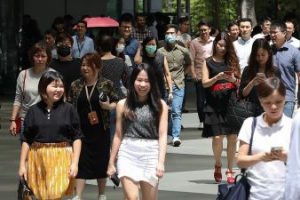 |
4 Mar 2020 | Tap the potential of female labour to keep Singapore buzzing | The Straits TimesSingapore's female labour force participation (LFP) rate has stagnated at about 60% for the last 5 years. The government has done much over the years to encourage female LFP by helping working mothers and addressing caregiving issues. CFPR's Steering Committee member A/Prof Jessica Pan commented that these measures can help ease constraints in work-life balance but are unlikely to succeed without "a fundamental change in the way work is organised". She noted the need for "bold policies that really get to the essence of what is driving these gaps" - gender norms or ideas of different roles for males and females in society. |
|
|
|
 |
3 Mar 2020 | Growing Old in SG l Uncovered | Millennials of SingaporeBy 2030, 25% of Singaporeans will be aged 65 and above. Singapore's ageing population is a growing concern as the greying demographic puts a toll on government spending. CFPR's Founding Director Professor Jean Yeung explained policies put in place to encourage adult children to live close to the older adults to make it easy to take care of their older parents. She also pointed out various measures the government is taking to subsidise healthcare for different generations (Pioneer, Merdeka and future generations). |
|
|
|
 |
27 Feb 2020 | Talking Point 2019/2020 - EP40 | Channel NewsAsiaIn Singapore, up to 75 bodies are unclaimed every year. Why do we have an increasing number of lonely deaths? And with a rise in one-person households, could we be at a higher risk of dying without anyone knowing? CFPR's Founding Director Professor Jean Yeung was interviewed by Channel NewsAsia for the Talking Point Program. She discusses how living alone by itself would not lead to higher death rates, but isolation and loneliness will. As our society ages and more people choose to live independently, it is important to prevent social isolation. |
|
|
|
 |
21 Feb 2020 | Fine-tune new measures to help seniors: Experts | The Straits TimesSingapore's new Budget measures aimed at boosting the retirement incomes and employability of seniors are a step in the right direction but may not go far enough, say observers. Experts noted that financial incentives alone might not be enough to counter ageism and discrimination in the workplace. CFPR's Founding Director Professor Jean Yeung commented that the enhancement of the Silver Support scheme announced in the Budget is quite substantial. She explained that "more disadvantaged older adults will benefit, particularly low-wage workers and older women who have not accumulated enough retirement income due to family responsibilities in their early years" through this scheme. |
|
|
|
 |
31 Jan 2020 | Looking to 2020: Tackling poverty and inequality in Singapore | NUS NewsSingapore is known as an affluent or middle class society. It has an adaptive knowledge-based economy which produces much opportunities for employment and social mobility. Is poverty the cause of bad decisions, or are bad decisions the cause of poverty? The two opposing views here suggest that either the poor are not to be blamed for the condition they are in or they are to be blamed. A socially responsible capitalism, including a vibrant economy and a progressive tax system to fund redistributive measures, is essential to ensure that all Singaporean meet their basic needs, writes Associate Professor Tan Ern Ser from NUS Sociology. |
|
|
|
 |
13 Jan 2020 | Money Mind 2019/2020 | Channel NewsAsiaThere has been a considerable increase in the proportion of single-person households around the world. In Singapore 14% of total households live alone. Single-person household typically involves older persons aged above 65 and urban youngsters who are earning for the first time. CFPR's Founding Director Professor Jean Yeung was interviewed by Channel NewsAsia for the "Money Mind 2019/2020" program. She shared her views on one-person households, how Asia's singles are changing consumption trends and the importance of studying their demographics in different countries for businesses to anticipate consumer behaviour. |
|
|
|
10 Jan 2020 | Pay gap between Singapore women and male peers narrows | The Straits TimesA study conducted by the Ministry of Manpower (MOM) and Associate Professor Jessica Pan (NUS Department of Economics, CFPR's research associate) found that the adjusted gender gap in median pay has decreased from 8.8% in 2002 to 6% - or $342 a month - in 2018. However, women in Singapore are earning less even if they may be doing the same job as male colleagues of the same age and education level, even as this pay gap has narrowed. The study noted that higher-paying roles - such as managing directors, chief executives and general managers, and sales, marketing and business development managers, still tend to be male-dominated. Occupation accounted for 43 per cent of the pay gap in 2018 and played the biggest role. Hurdles remain as unpaid care work remains skewed towards women. The study suggests ways to bridge the gap by getting companies to address possible bias in performance assessments. |
|
|
|
|
05 January 2020 | Married women here have less sex than desired: Study | The Sunday TimesA study by Assistant Professor Tan Poh Lin from the Lee Kuan Yew School of Public Policy at NUS found that married women in their peak child-bearing age in Singapore have a lot less sex than they desire, thwarted by stress and fatigue. The findings have significant bearing on Singapore's fertility rate. This independent research is the first here to examine the coital frequency of married women at their peak child-bearing ages, and to understand the effects of stress and fatigue on their sex lives. |
|
|
|
|
05 January 2020 | Popular places for retirement in Asia | Lianhe ZaobaoAssociate Professor Thang Leng Leng from the Dept of Japanese Studies at NUS Faculty of Arts and Social Sciences discussed the popular retirement places in Asia, and whether Singapore's high cost of living which dissuades the average Westerner from retiring here would also encourage Singaporeans to look to places in Asia for retirement. |
|
 |
31 December 2019 | Business outlook for 2020 | The Straits TimesDistinguished Prof Sumit Agarwal from the Department of Finance shared his views, together with other professors, on 2020's business outlook in five areas - macro economy, financial markets, board diversity, AI's impact on business, and leadership. In 2019, financial markets did fairly well in Asia and United States. However, for 2020, he expects more volatility and corrections to happen due to the global economic and political uncertainty, not only for Asia but also for the US. The biggest uncertainty for financial markets is global trade which has resulted in slower economic growth for several countries |
|
|
|
|
|
12 December 2019 | Potential link between drinking tea and reduced depression in seniors | NUS NewsBy analysing a survey of over 13,000 elderly participants living in China, a team of researchers led by CFPR's Deputy Director Associate Professor Feng Qiushi, from the NUS Faculty of Arts and Social Sciences, Department of Sociology, and his colleague Associate Professor Shen Ke, from the Fudan University, have found an association between consistent and frequent tea-drinking and significantly less depressive symptoms in Chinese older adults. Their results were published in the journal BMC Geriatrics on 4 September 2019. |
|
|
|
24 November 2019 | NUS public transport study: Working adults want reliable travel times; seniors, students focus on cost | TODAYA major study called "Travel Time Uncertainties and Commuter Behaviour: Evidence from Smart Card Data in Singapore" was led by Professor Sumit Agarwal, Low Tuck Kwong Distinguished Professor NUS Business School. It investigated how Singaporeans used public transport and found that the reliability of travel time was important for working adults while the cost of fares was a bigger factor for senior citizens, students, and children in choosing between travel modes. The study concluded that efforts to enhance the reliability of bus travel could encourage some adults to turn to bus travel and thereby alleviate "overloaded" trains during peak hours. |
|
|
|
|
 |
29 October 2019 | Parents' Housing Linked to Children's Economic Future | NUS NewsAn NUS study has revealed that the type of housing Singaporean parents own has a significant influence on their children's future economic status. The study was co-authored by Professor Sumit Agarwal, Low Tuck Kwong Distinguished Professor NUS Business School and Associate Professor Qian Wenlan from the Department of Finance at NUS Business, together with Associate Professor Sing Tien Foo, Dean's Chair and Director of the NUS Institute of Real Estate and Urban Studies (IREUS) and Assistant Professor Yi Fan from NUS Design and Environment. |
|
|
|
 |
18 October 2019 | The CPHOP Lifetime Achievement Award | NUS NewsCongratulations to Associate Professor Wong Mee Lian, who was conferred the College of Public Health and Occupational Physicians (CPHOP) Lifetime Achievement Award at the 14th Singapore Public Health and Occupational Medicine Conference on 15-16 October. A/Prof Wong has devoted more than 20 years of her career researching marginalised and vulnerable women in Singapore. She developed and evaluated programmes and behavioural interventions to raise awareness and reduce incidence of sexually transmitted infections (STIs) among sex workers. |
|
|
|
 |
10 October 2019 | A value-based system where healthcare providers are accountable for outcomes will benefit patients | TODAYA "good" hospital visit might mean getting high-quality care and emerging in better health, as quickly and painlessly as possible. Associate Professor Joanne Yoong, a former CFPR research associate, opined that many health systems are not designed to prioritise the type of care that patients value the most. She suggests value-based healthcare models as a solution that will strengthen metrics and evaluation and put in place financial incentives that ensure providers are held accountable for high-quality care, positive patient experiences and good health outcome. |
|
|
|
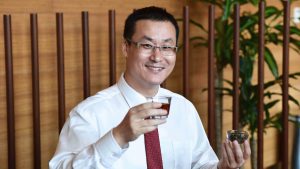 |
12 September 2019 | Drinking tea improves brain health | NUS NewsA recent study led by CFPR's Research Associate Dr. Feng Lei, from the Yong Loo Lin School of Medicine's Department of Psychological Medicine, revealed that regular tea drinkers have better organised brain regions - which is associated with healthy cognitive function - compared to non-tea drinkers. The research, carried out with collaborators from the University of Essex and University of Cambridge, offers the first evidence of positive contribution of tea drinking to brain structure and suggests that drinking tea regularly has a protective effect against age-related decline in brain organization. The findings were published in a recent issue of the scientific journal Aging. |
|
|
|
 |
3 September 2019 | Language, dialect heard in infancy never really forgotten, study finds | The Straits TimesA recent study led by Associate Professor Leher Singh, from the Department of Psychology, has found that Singaporeans who were exposed to Hokkien as young children because of their main caregivers, were able to process uniquely Hokkien tones and re-learn the Chinese dialect easily as adults, even though they had not used the dialect for years. This "ghost in the brain" effect shows that languages and dialects acquired early have a "special place in your brain, such that you can reactivate them under the right circumstances", said A/P Singh. |
|
|
|
22 August 2019 | Time to Counter Ageism in the Workplace | The Straits TimesProfessor Wei-Jun Jean Yeung, Provost-Chair Professor from the Department of Sociology at NUS Faculty of Arts and Social Sciences; Cluster Leader (Changing Family in Asia) at Asia Research Institute; and Founding Director of the Centre for Family and Population Research at NUS, opined that raising the retirement age is an inevitable policy shift. Employers and government need to work hard together to counter ageism and foster a work culture and environment friendly to a workforce with different age groups. |
|
|
|
|
11 July 2019 | Demographic discrepancies cause worry | China Daily Global"How will people support themselves during old age, especially those who do not work. They also need long-term care because as people live longer, those added years may not be healthy years," CFPR Co-Director Associate Professor Bussarawan Teerawichitchainan, on Asia's need to ensure the health and financial security of the elderly. She also commented on developing Asia's need to address the lack of family planning policies and cultural bias against women's reproductive health. |
|
|
|
|
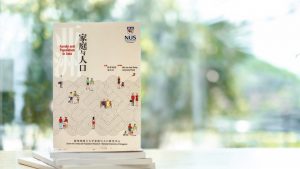 |
26 June 2019 | Asia's Family and Population in Focus | NUS NewsIn conjunction with its fifth anniversary, CFPR launched a new book - "Family and Population in Asia" at the Singapore Book Fair 2019 on 6 June. Comprising 30 bilingual essays based on evidential research by CFPR associates, Family and Population in Asia offers insights into challenges faced by Asian societies today, as well as solutions to move forward. Edited by Professor Jean Yeung (CFPR's Co-Director) and Associate Professor Thang Leng Leng (Head of Dept of Japanese Studies, FASS; and Fellow (Honorary) of the College of Alice and Peter Tan), the book delves into issues such as children, marriage, fertility, work, ageing, fatherhood as well as women and gender issues. |
|
|
|
9 April 2019 | How commuting times affect HDB flat prices | The Straits TimesSingapore is known as an affluent or middle class society. It has an adaptive knowledge-based economy which produces much opportunities for employment and social mobility. Is poverty the cause of bad decisions, or are bad decisions the cause of poverty? The two opposing views here suggest that either the poor are not to be blamed for the condition they are in or they are to be blamed. A socially responsible capitalism, including a vibrant economy and a progressive tax system to fund redistributive measures, is essential to ensure that all Singaporean meet their basic needs, writes Associate Professor Tan Ern Ser from NUS Sociology. |
|
|
|
|
 |
5 April 2019 | Centre for Family and Population Research celebrates 5th anniversary | The Straits TimesCFPR celebrated its fifth anniversary on 5 April, with Minister for Social and Family Development Desmond Lee, as Guest-of-honour |
|
|
|
21 March 2019 | Thailand set to face growing demands of elderly transition | China DailyThailand is now among the world's rapidly ageing countries, and the rising financial and healthcare needs of the elderly pose a serious challenge to its policymakers. CFPR Co-Director Associate Professor Bussarawan Teerawichitchainan shared with China Daily programs which Thailand has implemented to support the elderly. She said that despite several changes in the Thai government, the concerns of the elderly remain one of the authorities' top priorities. |
|
|
|
|
27 Jan 2019 | Employment for senior citizens can be more flexible | Lianhe ZaobaoProf Thang Leng Leng from the Dept of Japanese Studies at NUS Faculty of Arts and Social Sciences shared her interaction with an insurance salesperson who was still working full-time despite being close to 80. |
|
|
|
|
13 Jan 2019 | Department of Statistics: Increase in median monthly income for households | Channel 8CFPR Founding Director Prof Jean Yeung was interviewed on Channel 8's News Tonight as they talked about the highlights from the Department of Statistics' annual Key Household Income Trends report. She discusses about how current elderly trends are possible reasons for the changes in Singapore's median monthly household income trends. |
|
|
|
|
3 Jan 2019 | 'NUS study finds that severe air pollution affects the productivity of workers' | ResearchProlonged exposure to pollutant particles was shown to reduce the output of workers in China. Economists from the National University of Singapore (NUS), A/Prof Alberto Salvo, A/Prof Liu Haoming and Dr He Jiaxu have completed an extensive study which reveals that exposure to air pollution over several weeks is not just unhealthy, it can also reduce employee productivity. |
|
 |
28 Dec 2018 | 'Study: older adults care more about others' welfare' | Channel 8A study led by Asst Prof Yu Rongjun from the Dept of Psychology at NUS Faculty of Arts and Social Sciences found that when it comes to making financial decisions under risk, older adults will regard the financial outcomes of others' as their own and make choices that they would have selected for themselves, unlike younger adults. |
|
|
|
 |
2 Nov 2018 | 'Narrowing the inequality gap: How can children from low income families gain equal access to pre-school education in Singapore ?' | Channel 8Preschool education can reduce income inequality and facilitate social mobility in society. Prof Jean Yeung discussed the longitudinal early childhood study currently undertaken by CFPR to observe this and many other relevant issues about Singaporean children's early development. |
|
|
|
 |
4 Oct 2018 | 'The difference between Singlehood and Marriage' | Channel 8 newsCFPR Founding Director Prof Jean Yeung discussed the reason for the increase in the ratio of singles, and the impact of the single-person ratio on the economy and society. |
|
|
|
 |
27 Sept 2018 | 'Singapore's population grows slightly to 5.64m, with non-resident numbers stable' | Channel NewsAsia and Channel 8 newsAlthough the actual number of people getting married has increased in Singapore, the ratio of singles in almost all age groups has increased compared to the past decade. Prof Jean Yeung talked about womens' labor force participation and how it is linked to singlehood. |
|
|
|
 |
3 Sept 2018 | 'Singapore: the country with one of the world's lowest birth rate' | BBC World News and BBC World ServiceSingapore is reportedly facing one of the world's lowest birthrate, and the government has been taking many steps to improve the scenario. BBC World News and BBC World Service seek CFPR Director Prof Jean Yeung's views on certain aspects of this issue such as how low is Singapore's birth rate, whether it is a matter of concern, the measures taken by the government and if those steps are being fruitful. |
|
|
|
 |
28 August 2018 | 'China's Two-Child Policy' | Channel NewsAsia SingaporeAccording to Reuters, China appears to be setting the stage to end its decades-long policy of determining the number of children that couples can have, as suggested by a social media post by a state-run newspaper. CFPR Founding Director Prof Jean Yeung was interviewed to talk about the possible reason behind the change in the policy, impact of the two-child policy implemented on 2016, social problems caused by the one-child policy i.e. burden on elderly care, negative impact on the country's economic vitality. Lastly she talks about the government's initiatives to tackle the country's demographic problems while the effect of this policy change takes places. |
|
|
|
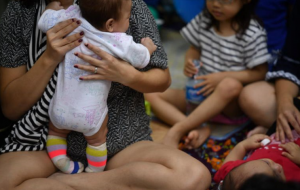 |
13 July 2018 | 'Fewer births, more deaths as Singapore population ages' | The Straits TimesCFPR Founding Director Prof Jean Yeung was interviewed on Channel NewsAsia's Primetime Asia program where she addressed global population growth issues such as ageing and migration. |
|
|
|
 |
18 June 2018 | 'How Do You Make People Have Babies?' | BBC World ServiceMore than half the world's countries are not producing enough babies to offset the number of deaths. Despite the government rolling out measures to encourage people to have more children, the fertility rate continues to drop. BBC World Service discusses this demographic crisis in 4 countries - Singapore, Sweden, France, and Israel in the episode titling 'How Do You Make People Have Babies?''. CFPR Founding Director Prof Jean Yeung shares her views on this issue pertaining to Singapore. |
|
|
|
 |
17 May 2018 | 25% of women aged 46-50 do not have children | Shin Min Daily NewsCFPR Founding Director Prof Jean Yeung and Dr Hu Shutalk about Singapore's low fertility and marriage rates, and possible policy changes to tackle this. |
|
|
|
 |
25 March 2018 | You date, government foots the bill | CCTV 13CFPR Founding Director Prof Jean Yeung shares about the various incentives the Singapore government has put in place, with the aim to help parents manage work and family, as well as to make marriage and family a more attractive option for singles. The video interview is only available for viewing on mobile devices. |
|
|
|
 |
20 February 2018 | Hello Singapore | Channel 8 NewsCFPR Founding Director Professor Jean Yeung was interviewed on Channel 8's Hello Singapore program where she discussed about various focus issues of Budget 2018, with special emphasis on care for the elderly and planning for the future. |
|
|
|
16 January 2018 | Dip in population density, but not in crowded feeling | The Straits TimesIn a recent article on Singapore's population density, CFPR Founding Director Professor Jean Yeung highlighted that the conscious decision by the government to limit the number of new immigrants has contributed to slower population growth. |
|
 |
6 December 2017 | Singapore Tonight | Channel NewsAsiaCFPR Director Prof Jean Yeung was interviewed on Channel NewsAsia's Singapore Tonight program where she addressed the issue of Singapore's "demographic time bomb". |
|
|
|
 |
10 November 2017 | Late marriages and low fertility rates in Singapore | CCTV-13 World ExpressIn the interview, CFPR Director Prof Jean Yeung discussed how women feel more pressure as gender roles pushes them to take care of the family while they try to develop their careers, and how this results in more people shying away from marriage and parenthood. |
|
|
|
1 October 2017 | Earlier marriages tend to have higher fertility rates | Channel 8 NewsIn the interview, CFPR Director Prof Jean Yeung discussed the trends of timing in marriage and fertility in Singapore. She highlighted that early marriages may help to increase birth rates. |
|
|
|
|
12 September 2017 | Commentary: IKEA's month-long paternity leave a shining example to be followed | The Straits TimesCFPR Director Prof Jean Yeung discusses how children, families and society benefit when fathers take paternity leave, and may even boost fertility rates. |
|
|
|
|
 |
July/August 2017 issue | Demographic Trends in Southeast Asia | ASEANFocusIn the July/August issue of ASEANFocus by ISEAS, CFPR Director Prof Jean Yeung highlights the current uneven state of development in Southeast Asia, and its implications on human capital development, elderly care, and poverty. You can read her featured article on p. 12-14. |
|
|
|
 |
23 July 2017 | Church pioneers integrated facility for children, seniors | TODAYCFPR Deputy Director Prof Thang Leng Leng emphasised that inter-generational interaction was an important benefit of having an integrated facility serving both children and seniors. |
|
|
|
 |
22 June 2017 | Primetime Asia Program | Channel NewsAsiaCFPR Founding Director Prof Jean Yeung was interviewed on Channel NewsAsia's Primetime Asia program where she addressed global population growth issues such as ageing and migration. |
|
|
|
 |
17 May 2017 | The impact of crowdedness on housing prices | The Straits TimesDr Eric Fesselmeyer highlighted that an increase in localised density negatively affected prices, thereby carrying important policy implications since almost all cities regulate density using measures such as plot ratio in Singapore. |
|
|
|
27 April 2017 | $21 million in grants awarded for 12 research projects on Singapore society, identity | The Straits TimesCFPR Director Prof Jean Yeung leads a multi-disciplinary team for an $8.5 million national panel study on Building Capacity in Singapore's Population: Testing Innovations in Human Development. The project looks at 5,000 families with children aged six and younger, and studies how factors such as early childcare, preschool attendance, the use of technology and family stress, can shape child development and family resilience. |
|
|
|
|
29 January 2017 | Singapore's plea to its people: Won't you please have more children? | The Christian Science MonitorA/P Thang Leng Leng, CFPR Deputy Director, shared her views on the challenges facing governmental efforts to boost Singapore's fertility rates. |
|
|
|
|
 |
19 January 2017 | Singapore Tonight | Channel NewsAsiaCFPR Founding Director Professor Jean Yeung and Prof Mary Brinton, Reischauer Institute Professor of Sociology, Department of Sociology, Harvard University, discussed how to support couples in starting families and boosting Singapore's fertility rates. |
|
|
|
19 Jan 2017 | Distinguished Public Lecture on Family and Population, Postindustrial Low Fertility in Europe and East Asia: Lessons for SingaporeMore than 250 academics, students and policy makers attended the 19 January Distinguished Public Lecture jointly organised with Global Asia Institute. The Guest-of-Honour for the event was Senior Minister of State Mrs Josephine Teo, Prime Minister's Office, Ministries of Foreign Affairs and Transport, Republic of Singapore. Our distinguished speaker was Professor Mary Brinton, Reischauer Institute Professor of Sociology, Department of Sociology, Harvard University. |
|
|
|
|
19 January 2017 | 杨莉明: 年轻一代需对婚姻 有全新的视野 | Mediacorp Channel 8 News |
|
|
|
|
19 January 2017 | 专家:我国要提高生育率 可能得在职场推行更多亲家庭措施 | Capital Radio 95.8 FM |
|
 |
28 October 2016 | Senior Care in China | China Radio InternationalProf Jean Yeung discussed the issue of senior care by examining the ageing trends and family structure changes in China as well as the practices and challenges in caring for older adults in China and Singapore |
|
|
|
 |
13 October 2016 | BBC Radio 5Prof Jean Yeung shared her views on how most Singaporeans' life courses, including birth timing decisions, and social lives are built around the prevailing HDB culture. |
|
|
|
9 October 2016 | Dealing with exam stress | The Straits TimesA/P Thang Leng Leng shared her views on how parents help their children in dealing with exam stress. |
|
|
|
|
25 September 2016 | Singapore's job crunch: Time to learn new skills and update that CV? |
|
|
|
|
|
24 July 2016 | No money, no getting married: many delaying to build careers first | The Straits TimesCFPR Founding Director Prof Jean Yeung observed that the increase of people in Singapore marrying at an older age reflects a global trend - the lengthening of the transition to adulthood. She explained that young adults now take longer to finish their education and invest heavily in their careers. |
|
|
|
|
 |
9 July 2016 | Keeping up with the Wangs | The EconomistProf Jean Yeung commented that the young feel worse off because they compare and judge themselves against their peers, even if their lives are comparatively better than their parents. |
|
|
|
 |
22 June 2016 | The Lonely Aftermath of China's One Child Policy | Bloomberg NewsCFPR Founding Director Prof Jean Yeung commented about the rising prevalence of one-person households in China. |
|
|
|
 |
8 June 2016 | Primetime Asia Programme | Channel NewsAsiaProf Jean Yeungdiscussed the long-term implications of China's university entrance exam and entry into top universities, as well as rural/urban inequalities in the education system. |
|
|
|
5 June 2016 | Juggling work and family time, achieving good work-life balance is possible | The Straits TimesA/P Thang Leng Leng, Deputy Director of CFPR, commented on the importance of communication in achieving work-life balance |
|
|
|
|
2 June 2016 | The class ceiling | The EconomistA/P Thang Leng Leng, CFPR Deputy Director, shared her views on the challenges facing governmental efforts to boost Singapore's fertility rates. |
|
|
|
|
26-28 May 2016 | ISA RC28 Conference on Intergenerational Transfer, Human Capital and Inequality:
More than 250 scholars from over 30 countries, together with Singapore policymakers, converged at NUS from 26-28 May for an international conference on "Intergenerational Transfer, Human Capital and Inequality," hosted by CFPR. The Guest-of-Honour for the event was Mr Tharman Shanmugaratnam, Singapore Deputy Prime Minister & Coordinating Minister for Economic and Social Policies, and the Keynote Speaker was Dr Noeleen Heyzer, Social Scientist and Former Under-Secretary-General of the United Nations and Member, NUS Board of Trustees. |
|
RC28 Conference Presentations featured in The Straits Times:1 June 2016 | Study: Kids from affluent families more likely in IP, GEP schoolsBy Ong Xiang Ling and Dr Cheung Hoi Shan 1 June 2016 | Students in IP schools more confident of getting at least a university degreeBy Ong Xiang Ling and Dr Cheung Hoi Shan 30 May 2016 | Poll on elderly Singaporeans throws up surprisesBy Assoc Prof Angelique Chan 28 May 2016 | More girls entered better JCs over past 4 decades: StudyBy Dr Vincent Chua |
|
|
|
|
2 February 2016 | At least 33,793 Jubilee babies born in 2015, the highest in 13 years | The Straits TimesProf Jean Yeung commented about the record birth during the Jubilee Year, the highest in 13 years. |
|
|
|
|
 |
27 January 2016 | Asia Business News | BBCProf Jean Yeung was interviewed on BBC's Asia Business News. The episode discusses the connection between economic growth and birth rates in Asia. |
4 January 2016 | More incentives urged for increased parental leave, work flexibility | TODAY OnlineA/P Thang Leng Leng, Deputy Director of CFPR, shared her views on how companies can offer more incentives for flexible work arrangements. |
|
 |
4 December 2015 | Hello Singapore | Mediacorp Channel 8's current affairs programmeProf Jean Yeung was interviewed in Mandarin on the issue of the growing trend of aged resident households in Singapore. |
|
|
|
 |
29 August 2015 | Young, single, and what about it? | The EconomistProf Jean Yeungresearch was cited in a recent issue of The Economist that discusses one-person households among the young in China. |
|
|
|
27 August 2015 | The kin and I | The EconomistProf Jean Yeung research was cited in a recent issue of The Economist that discusses the rising number of old living alone in China. |
|
|
|
|
 |
9 May 2015 | Jean Yeung: Men now expected to bring home the bacon - and cook it | The Supper Club | The Straits TimesProf Jean Yeung shared her views on Singapore's low fertility and marriage rates, on getting fathers more involved in supporting the family, an increasing number of singles and single-parent benefits. |
|
|
|
24 July 2016 | No money, no getting married: many delaying to build careers first | The Straits TimesCFPR Founding Director Prof Jean Yeung observed that the increase of people in Singapore marrying at an older age reflects a global trend - the lengthening of the transition to adulthood. She explained that young adults now take longer to finish their education and invest heavily in their careers. |
|
|
|
|
28 April 2015 | CFPR's Official Launch and Conference on Singapore Families and Population DynamicsCFPR held its official launch and inaugural conference on Singapore Families and Population Dynamics on 28 April 2015. It was graced by Minister Grace Fu and attended by NUS President Prof Tan Chorh Chuan, FASS Dean Prof Brenda Yeoh, the rest of the FASS Deanery, distinguished scholars, policy makers, students and the media. |
|








